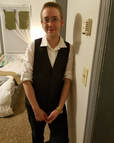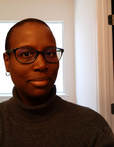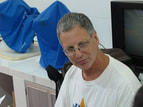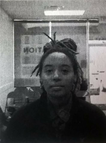|
12/31/2017 Poetry by Remi RecchiaOn Leaving Planet Fitness at Two in the Morning Because It’s Late & You Can’t Have a Drink Right Now I ate a sponge last night & it was warm like bullfrog brushing soap spuds I never knew to freeze vodka until my rapist taught me to December sky empty as always wife’s touches quiet & aching we came last night & wept pillow fell white underneath our quiet I don’t have to say what violation feels like: sharp sting of needlework on down—but have you heard a toad cry in winter? Its spots livered, mouth puckering into beak. Yellow underbelly growing fuzz. Small lungs breathing lint.  Bio: Remi Recchia is an MFA Candidate in Poetry at Bowling Green State University, where he serves as Assistant Poetry Editor for the Mid-American Review and teaches Creative Writing. His work has appeared in or will soon appear in the Pittsburgh Poetry Review, the Old Northwest Review, Blue River Review, Front Porch, Gravel, Glass: A Journal of Poetry, and Ground Fresh Thursday Press, among others. 12/31/2017 Poetry by Maia Brown-JacksonWe started as a lie We started as a lie and the truth burned us out. The truth is you used my body and ignored the soul occupying it, letting wine and honey flow until I would give you anything and believe for a moment that I wanted it. The truth is you loved yourself, and I was a beautiful accessory. The lie is that you wanted to save me. Darling, I never needed saving, I am a hurricane, a wild fire, a supernova and I am meant to burn out so that something lovely and strong might grow from my ashes. The lie is that you knew me. Dearest, I might be a princess and I might be an alien and I might be a crime scene, but I am still a girl. Still a girl, and that encompasses multitudes. Yes love, the lies were sweet, and they were beautiful, and they made me believe, but I am honest, and I must seek the truth. I loved you loving me. And I stopped loving myself. We were not forever, we were somewhere between a waning moon and a natural disaster. Reality flipped on our retinas and we shrugged, and let gravity reverse. I struggle to find my soul, now. I let you bury it deep inside, and I’ve scoured my body top to bottom but see no sign of it. So now I begin my search. There is a piece in the light of the evening star, another in the steam rising from the first cup of rich, bitter coffee. I can detect another in my father’s laugh, another still in my mother’s tears. There is one in her hug, and a dark piece at the bottom of every glass, a piece you always stowed away, and I might spend my lifetime finding them again. Yes, I am shattered and yes, I am broken. And yes, you did this. But it is not the end of me. Now I seek my soul, and in so doing, I find the broken bits, the cracked and burning pieces, that belong to so many others. You did not break my heart, but you hurt my soul. And when I rebuild it, I will not see you again. Like Rome Like Rome, I am a creature of the sun, and I am built on ruins. There are ghosts hiding in my dark spaces, but as long as I am haunted I know that I’m alive. Because my brain might be a clusterfuck of nuclear waste, but I do not judge. So when I get high on a neverending cosine, and snort the different wavelengths of light you can see just at the periphery of your vision, remember that I am the end of winter and the night dripping down my back has only made me stronger. The creatures that hide between the uneven spines of cracked and crumbling books that you never bothered to read-- they are what sustain me, and they know I am not so mad as people think, and they have collected the broken pieces of my psyche, and together we will brave hell. So if I’m paralyzed with fear, if I’m trembling while you say a prayer, it might be because this world is almost heaven and it’s going to burn. And love, I’ve always wanted to be amazing, so I will try to stop it, and I will die, and it will mean something, and when you find the remains of my body, of my life, you will see the great and terrible empire I became.  Bio: Maia Brown-Jackson is an exhausted graduate student at the Fletcher School for Law and Diplomacy. She dreams of saving the world and accepts that for the moment that means exams on corporate finance and American history as told by white men. While struggling not to injure herself in krav maga and sublimating stress through baking, sometimes she writes poetry so she doesn't have to experience actual feelings more often than necessary. 12/30/2017 The Nightshift Kid by Jason JacksonThe Nightshift Kid You only worked there for three weeks. It was back when they had huge printers the size of cars for all the letters they had to send. The paper they used had perforated edges to drag it through the printers, and the machines cut them off before folding the letters and slotting them into envelopes. There were ten machines in the warehouse, and on your first day a man called Don with a crew-cut and a limp showed you how to empty the printer bins. The sound of the machines was loud, a whirring, like dying engines. “Unhook the sack,” he said, doing it. “Then drag it over to the chute.” You followed him across the floor to the black hole in the wall. “Hook the sides of the sack here,” he said. “Then press this.” Metal levers lifted the huge sack, and the paper strips with the little holes poured into the darkness of the chute. “What’s down there?” you said. But Don was already walking back with the empty sack. “Keep moving. By the time you’re round to the first machine again, the sack’ll be just about full” It was easy and hard at the same time. After a while, you’d slow down, and if one of the bins started to overflow, an alarm would sound, and you’d have to speed up to get there, otherwise the paper strips would just pour out. The machine wouldn’t stop, though. The machines never stopped. Don was the overseer. He’d pop his head around the door every hour. At lunchtime, he’d come and take over so you could go and eat your crisps in the small staff room. Some women had their lunch there too, black tights clinging to their long legs under their tight skirts. Women whose fingernails skittered on the tabletop as they drank their coffee. Women whose boyfriends had dicks which were too small, or too soft, or too big, or too hard. Women who liked to go to the Star and Garter on a Friday lunchtime and not invite you. You had no idea what these women did, which part of the building they worked in, and they never once said a word to you. The day after Don had shown you the ropes, you turned up at eight and there was some other kid emptying sacks at the other side of the warehouse. You realised there must be a nightshift, and that this was the nightshift kid. He looked up as you walked in, and you nodded, but by the time you’d hung your coat in the staff room, he’d gone, so you just started on the next machine along. Five days a week, you walked around the warehouse floor, fours hours in the morning, four hours in the afternoon. Just before your shift ended, another would kid would walk through the door. He’d nod at you on his way to hang up his coat, and you’d wait for him, then you’d go and get your coat and leave. It was his shift now. You got your wages in a brown envelope at the end of the week from a man in glasses who didn’t look at you, and there were some engineers who would come in to fix a machine whenever one went down, but there was no one else. Don was just a head in a doorway. The women may as well have been film stars. There was only the incessant grind of the machines, the paper-dust, and the chute. On the last day, you turned up like normal, but walking across the yard you knew something was wrong. There was no noise. The man with the glasses was outside the doors to the warehouse. “Closed today,” he said. “How come?” “Go home. Come back tomorrow. We’ll be back on then.” Don was on the steps outside, rolling a cigarette. “The nightshift kid,” he said “Chucked himself down the chute.” “Christ,” you said. “When?” “Dunno,” he said . “Ambulance’d been and gone by the time I got here.” “What’s down the chute?” you said. “Compactor. The paper gets crushed into these big solid blocks. Weird looking things. They get packed onto a truck that takes them away.” He held out his pack of tobacco. “What are they going to do?” you said. “Well, they’ve switched off the machines.” “You told me they never switched them off.” “They have today, son.” You sat there smoking for a while, and then Don stood up. “See you tomorrow,” he said, and you watched him walk towards the gate. It was quiet in the yard, and for a short while you stayed, just to listen.  Bio: Jason Jackson writes short fiction and, occasionally, poetry. He also takes photographs. In a busy life he hopes to get better at all three. Find links to his published words and pictures at jjfiction.wordpress.com Jason tweets @jj_fiction 12/30/2017 Poetry by jennifer del castillo I figured it out. It'll always be me. I'm the common denominator as to why people behave the way they do around me. Even though I have made changes in my life, it'll always be me. Like the recovering addict that hasn't had a drug in years, the stigma will always be there. Spoken or unspoken. It'll always be me. Maybe I'm fighting for something I never really had Happiness, which is told is my birthright Told that it is everyone's’ birthright Yet there's no sense of happiness or joy Because the damages have been done from the “community” Being kind to others in my life who in return talk about me behind my back; critical of who I am and what I'm trying to do with my life Even though it is a daily struggle to work towards being “better” People who disparage others while their own lives are a mess The glass house that's full of holes Trying to regain some sense of consistency and normalcy with physical and mental health but it is a struggle everyday Asking for openness and honesty from others, yet things are being hidden and people being protected Not until words are spoken and things are revealed does the truth come into the light People shying away from me because “I'm too much to handle” Because I ask for openness, kindness, respect? It must be me It has to be me Maybe I'm the problem Maybe I'm fighting for something that I never really had after all  Bio: jennifer del castillo came into writing and photography, as a way to find meaning in life after becoming disabled and recovering from trauma. the intention she looks to create is not to be perfect with the work. instead it is up to observers to come up with their own interpretations. you can find her at smallslowstep.com and on Twitter/Instagram (@smallslowstep). 12/30/2017 Poetry by Michael H. BrownsteinHER HANDS Her hands the claws of woodwinds and storm clouds, the shape of a scream, the o of a mouth, the oval of head, fingers stretching and stretching horribly, contentiously, fencing in all that contains madness and stability. When I met her at the smell of a neck, I tumbled into wonder, into worship, into always never being able to let go again. There was not a sparrow hawk nearby, but a soft breeze, the scent of ethnicity, the color of blueness in the clouds. I follow to where the path goes through the belly of bark into the skinny trail of hammer thronged ants, wheel bird beetles and a flourish of sapsucker bees. Here the way is blocked, here the way continues, here is how you compose a love poem from the sighting of a bird on a tree near the cone heads and boulders, the end of a plain and a playing field, a thin waterway, the land of flesh eating darters and mud bottom bass. SLIPPING INTO BREATH When his mind began to blister and skip into missteps during double-dutch games he never played, he found himself deep in breathpause focusing on the soft sound of one hand clapping he could not describe; the comeback line to your-mama’s-so-ugly he could not play; the broken rhinoceros fan, a Zen Koan, he would never comprehend. Suddenly the curb at the street was before him, an insurmountable obstacle of Olympic stature, and he forced himself to breathbrake, to take each step as a direction from his head, one foot over the edge, then the other until he was safe, two feet on the street, the curb behind him, walking away without having fallen. He wondered then if he could ever compete in the dozens or race downwind in a flying kite jacket, the lift of the currents of everything taking him to another place of safebreathing. Of course, this was nothing to be concerned about, isn’t that what everyone told him. But then he never asked. IN THE MORNING IT WILL STILL BE OK This is not who I love. This is not what I love. Love is a god-stone, thick and sometimes valuable, strong-wristed, one arc of a finger stretching. Love has the weight of god, the weight of Eve’s sister, Lilith, and vomit, water mixed with salt, A mottled permutation of tear strained skin, pink and ordinary, thinly veined and iridescent, the sigh of sun arriving into day’s orange blue. This is who I love. This is what I love. An evening of chimneys and steam, a cloud of feather and frog, green eyes.  Bio: Michael H. Brownstein has been widely published throughout the small and literary presses. His work has appeared in The Café Review, American Letters and Commentary, Skidrow Penthouse, Xavier Review, Hotel Amerika, Free Lunch, Meridian Anthology of Contemporary Poetry, The Pacific Review, Poetrysuperhighway.com and others. In addition, he has nine poetry chapbooks including The Shooting Gallery (Samidat Press, 1987), Poems from the Body Bag (Ommation Press, 1988), A Period of Trees (Snark Press, 2004), What Stone Is (Fractal Edge Press, 2005), I Was a Teacher Once (Ten Page Press, 2011), Firestorm: A Rendering of Torah (Camel Saloon Press, 2012), The Possibility of Sky and Hell: From My Suicide Book (White Knuckle Press, 2013) and The Katy Trail, Mid-Missouri, 100 Degrees Outside and Other Poems (Kind of Hurricane Press, 2013). He is the editor of First Poems from Viet Nam (2011). 12/29/2017 She Swallows Smoke by Candace HartsuykerSilvia Sala CC She Swallows Smoke In her picture, she is sitting outside on a lawn chair, her face tilted up to the sun. Innocent green eyes. Her hair is long and she is half smiling. One arm is draped over the arm of the lawn chair, displaying her long slender fingers—the large hands she hates because she says they look like a man’s hands. I see snippets of the woman I know now. At forty-two years old, her lungs hold the capacity of a drooping water balloon. Each breath she takes comes in shallow, uneven, hiccup-like bursts. Her hands are as wrinkled as leaves that have been torn and trampled on and then belatedly put back together again. Like hot glass, her breathing and her body have become contorted, bent out of shape. Now her back is slouched, her waist as thin as a lampshade in proportion to the rest of her body. Once she could swim for hours, holding her breath. Now each breath is a chore. Once she lived in water and air, now she lives in smoke. It wraps around her like a scarf. She knows she is inhaling and exhaling chemicals that have been used for nail polish remover, rat poison, barbeque lighter fluid, rocket fuel, insecticide and rubber cement. She has memorized their names. Acetone, Arsenic, Hexamine, Methanol, Nicotine and Benzene. For my birthday, she gave me a green scarf. I wore it once or twice. Now the end of it has unraveled. I can see the loose threads, and two small holes. All I can think is that the scarf is falling apart, and so is she. I can see how she will look when she is old. An oxygen tank will become an extension of her body. I do not want to know her like this. Over the years, she has told me, don’t make my same mistake. You don’t know what it does to your body. I do not tell her that I already know.  Bio: Candace Hartsuyker loves 1940s screwball comedies, YA lit, all things theater and film noir. She is a first-year fiction student in McNeese State University’s MFA Program. 12/29/2017 Poetry by Amber Miller(Mis)Understanding" For twenty years I lived with my neck under The weight of your crushing foot When foot is just a metaphor for control. Dominance. Paralyzed, not in body, but mind and spirit With fear. Despondency. Cowardice. The one thing I could never Forgive myself for. My skin soaked in your territorial piss and now I understand Can’t wash it all away Can’t hope it all away Can’t scream it all away Can’t cry it all away Can’t scratch it all away How long is now I hope you die before you see this Because I’m too much of a coward to Say it to the cracks in your face I wish my hate meant something I wish it moved more than my arms to Violently stab this pen into paper Or to inflict this misguided damage upon myself With blade and blood I’ve found another way to Caress this pain And agitate this withered heart My guts and callouses And everything they’ve seen Every stitch of flesh I’ve given You’re insatiable; ugly And when Your subtleties they strangle me And my worst fears are made flesh And I can’t recognize my engorged face- blue and purple And when there is no god or law to beg And when I have screamed until I faint And when there is nothing left but a body And when there is nothing but my mangled remains And when there is nothing I hope you’re happy. In you I lose myself When I’m tired of white knuckling through life you are there to ease the pain. A balm for my suffering. Full of depth. Deeper-than-blood red. Brown like honey. Clear like a river. Whatever color I need you paint my world with. Intoxicate me. Make me forget. Release me from all inhibitions. I fall asleep with you in my hands. Cathartic comatose-like sleep. My first taste of peace. I love you, my crutch. My safety. I don’t even have to speak and you know how to treat me. You don’t waste time in taking away all my burdens. All my thoughts you empty me of. All my weight you carry. All the ugliness in this world that I reflect, you erase.  Bio: Amber Miller is currently studying teacher education in the Midwest. Miller's poetry and essays have been featured in The New Verse News, Making queer history, and Aois21 Publishing. For Brian, Somewhere in Upstate South Carolina The hands of the clock meant little to you. Rather, they pointed out concepts, made suggestions, whispered epiphanies. Your muse: a last-minute hey-if-you-get-around-to-it calling from just beyond a wall of fog. But you always showed, and always with an offering: books, music, a kind word. Back left corner: an empty seat. At graduation, your mother’s bowed weeping face, your father’s grim silent nod in my direction across a velvet regalia sea. I fumble across the dusty parquet, and nearly trip on my own useless funnel of a sleeve. Double-major diploma, with honors that you are not here to receive. Somewhere in upstate South Carolina, beneath the cheap tan chenille of winter-fallow fescue, you lie in a burlwood box. My heart still drops. It may never hit bottom.  Bio: R.S. Williams taught college writing for 19 years before starting a new career as a freelance writer-artist-editor. She documents the small things most of us miss: moments when light falls across a wall, a sign, the sky, a face. Her current projects include the photo series For Wes and her debut novel, Songs My Father Barely Knew. Surviving a misdiagnosed illness which nearly killed her and more than a few of life's most difficult onslaughts, Jenn Vix puts full emphasis on creating from an intense need to survive. "I could not emotionally handle listening to music for about a year," she says. Then, like a reprieve in the eye of the storm, a fateful encounter with John Ashton (Psychedelic Furs) at a live radio gig rekindled Vix's creative muscles; a fire, surely, had been nearly burning all along. "I didn't think I had it in me." Jenn says. "I pushed myself to do it; I didn't/don't want to give up. The title track, "Unlocked," is about longing to be freed up from pain, fear, and loss, and oddly enough, I wrote it right before I got sick." Having come through the jagged edges of the impossible, Vix offers her take and advice on self care/boundaries, caution, keeping good friends/band-mates close, (never go into the trenches with someone you have to keep an eye on) and leaves us with one of life's most important reminders, no matter what path you're on; "Please do not listen to anyone who tells you to give up." AHC: Tell us about Unlocked, what are some of the central themes at work for you on this latest E.P.? The album, from a listener's standpoint, feels very cathartic, a type of sonic bloodletting, did it feel that way for you as well, in the making? JV: It was an emotional release, and it was mostly inspired by an intense need to survive, and also other emotional situations I was going through, before and during the time that I almost died of a misdiagnosed illness. I'm also a domestic violence and rape survivor, and though it's not easy to talk about these situations, I suspect that if I do, it might inspire someone else to talk about their problems. AHC: You work with a great line up of musicians and collaborators, what was the overall recording process like, are there certain magical "aha" moments that stand out to you on the crafting and recording of this record? JV: Thank you. It has been a pleasure to work with all of them, equally. They all bring different things to the table, and I appreciate it a lot. Because of my previously mentioned illness, I could not emotionally handle listening to music for about a year, and then a while after that, I somehow managed to do a live radio gig, with John Ashton. When he showed interest, it helped to inspire me to go back to work. I got back into recording after the gig, and so my "aha" moment was just being able to get this done at all. I didn't think I had it in me. I pushed myself to do it; I didn't/don't want to give up. The title track, "Unlocked," is about longing to be freed up from pain, fear, and loss, and oddly enough, I wrote it right before I got sick. AHC: Who have been some of the enduring, transformational influences for you throughout your life and what have you learned and adapted from each of them? JV: My grandmother; who has intense mental strength. She taught me to never give up. Robert Sharon, Ph.D in Music; he was there for me when things went badly at home, and he took time after the school day to talk with me, and to teach me proper singing technique. He was the best teacher I've ever had. I adore him. Michael Feeney; who is now the guitarist in my band. He helped me to get through the near-death experience, and I'm beyond thankful that he's back in my life. Marco Pirroni; I trust him; and it takes a lot for me to trust someone. He's a stellar human being, and a brilliant musician. Steven Severin; without him, I likely would never have picked up a bass guitar. Graham Lewis; his music and his personality are a gift to this world. The sound of his voice and his bass playing do strange and wonderful things to my brain. Malka Spigal-Newman; The sound of her voice goes through me like a hot knife goes through butter. She's kind, beautiful, talented, and an inspiration to me. There are also so many writers, scientists, artists, dancers, filmmakers, singers, actors, and visionaries who have inspired me, that it would take me hours to list them all. I have an intense interest in science fiction. Peter Capaldi, as The Doctor; on Doctor Who, is brilliant! The regeneration Christmas Special won't be easy for me to watch, but I know I have to try to watch it. This might sound corny, but I'm probably going to cry my eyes out.
Paul LF
AHC: Do you have any words of advice or encouragement for musicians who are starting out, the pitfalls and ruts they should be mindful of? JV: Please do not listen to anyone who tells you to give up. It's good to have a backup plan, but you can make time for music. If someone demands that you to stop playing music; because they are jealous, or selfish and controlling, they likely won't change, and it's a good idea to get away from them as soon as you can. A good mastering engineer is extremely important. Mastering is the frosting on your music cake. A good (international) publicist, with a strong client list, is absolutely worth your time and money; if and when you get past the local level. If you're not feeling creative that day; or night, don't force it, and try not to worry about it. Just wait until you feel inspired. You will be compared to other bands, and you may end up being boxed into one genre; even though you have more than that going on in your music. Just because someone thinks you're a copy of someone else, doesn't mean that you are. Constructive criticism is vital, but it's a good idea to ignore the assholes who give backhanded compliments, and or who lash out at you. At the end of the night, if you've played to a fairly good sized audience, and the promoter doesn't want to pay you, take them to small claims court, and or never work with them again. Always pay your session musicians, fairly. They also have bills to pay. If you make money at a gig, the money should be divided up evenly between band members. Even if you play for 5 people, and they stay in front of the stage for the whole show, that counts as a good gig. Make sure to keep a close watch on your gear. I've had things stolen from me, and also from friends who are in bands. If you can't afford a trustworthy roadie, ask a good friend to watch the gear, and then buy them dinner, or do them a favor in return. When the gig is over, make sure you get your stuff out of the venue, and into a locked car, van, etc.. then go back in and have fun if you feel like hanging out. Always list the musicians you've worked with on every recording. It's shitty not to credit them. If someone in your band, or anyone else, is repeatedly baiting you into arguments, seriously think about getting them out of your life. They get off on your anger. It's an emotional feed for them. If anyone hits you, or threatens to physically harm you, please get a restraining order as soon as humanly possible. I've worked with a couple of people who turned violent on me, and I went right to the police, and to the court system. AHC: What's next, any new projects in the works, or ideas in embryo? JV: I plan to shoot some more music videos, and to release more new music in early 2018. Keep up with Jenn Vix Website | Facebook | Bandcamp | Soundcloud | YouTube | Twitter | Instagram 12/22/2017 December 31, 1962 by Beth GordonDecember 31, 1962 40 weeks later she named me, Sarah Brooke Wolff, wrote it in invisible ink, knowing it would be replaced, her sin punished. New wool coat over old crepe dress, she climbed from window sill to tree branch, as if she’d done it before, her parents distracted by cigarettes, champagne and traditional holiday sex, it wasn’t hard to leave unnoticed, to walk across eight winter streets in her single pair of black high heels and meet him in the basement bedroom, his own mother passed out early, not one to wait for a ball to drop. I want to invent a nice young man, remove the smell of dirt, stale beer, the way his eyes glistened when he spoke to her of Hester Prynne, using all the right language: inequality, feminism, puritanical power, all the while imagining what words he would brand onto her skin, hidden beneath sensible white panties and cotton bra. I see him in the shadows, measuring the distance from his mouth to hers while she speaks about the way women have suffered in history and art, the impossibility of deciphering the pain of Mrs. Dalloway, he correctly judges that she believes everything she says. She knows he believes in nothing, she watches him rise and she is happy, I insist on this truth, that this moment be flooded with joy, this is how people drown every day, and even if I could, I would not save her. I am never like Abraham’s wife, I am sometimes an untamable stream of water, I am always Canus lupus, part predator, part poet, part deceptive fortune teller, part woman who should have stayed at home that night but released herself, forever.  Bio: Beth Gordon is a writer who has been landlocked in St. Louis, Missouri for 16 years but dreams of oceans, daily. Her work has recently appeared in Into the Void, Quail Bell,Calamus Journal, DecomP, Five:2:One, Barzakh, and others. She can be found on Twitter @bethgordonpoet. |
AuthorWrite something about yourself. No need to be fancy, just an overview. Archives
April 2024
Categories |











 RSS Feed
RSS Feed
